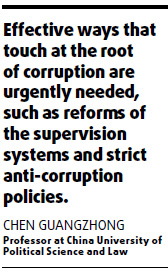Government and Policy
New chief named for Shanghai anti-graft bureau
By Wang Hongyi (China Daily)
Updated: 2009-12-26 08:57
 |
Large Medium Small |
SHANGHAI: A special task force charged with wiping out corruption in this East China metropolis has been appointed a new leader.
Gu Guolin was installed as the head of the Shanghai Corruption Prevention Bureau on Thursday, said a statement released on the municipal authority's website.
Gu has been vice-secretary of the Party's Shanghai Disciplinary Inspection Committee and director of Shanghai Municipal Supervision Bureau.
On Friday, ex-deputy director of the city's environment protection bureau, Yan Shunjun, was sentenced to 11 years in prison for taking brides worth more than 1 million yuan ($147,000).
Zhang Keming, former deputy head of Putuo district, was also this year sentenced to 13 years for taking bribes worth 1.8 million yuan.
The anti-corruption bureau in Shanghai, one of three under the National Bureau of Corruption Prevention set up in 2007, is charged with devising ways to prevent graft, as well as monitoring suspicious assets and suspects.
|
 |
It will work closely with prosecuting bodies, courts, police and financial organs at all levels to collect and analyze information to detect corrupt officials, said officials.
"Effective ways that touch at the root of corruption are urgently needed, such as reforms of the supervision systems and strict anti-corruption policies," said Chen Guangzhong, a professor at China University of Political Science and Law.
"So far, it is not clear what specific method the (national) bureau will take to prevent corruption. I think to push forward transparency of government information and set up a property declaration system for officials would be highly effective, as is the case in many other countries," he said.
During the first half of this year, more than 19,200 cases of corruption, bribery and dereliction of duty were detected, involving about 24,500 people, said authorities.












